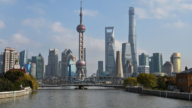【新唐人2014年08月07日訊】繼上個月底美國電腦軟件巨頭「微軟公司」在北京、上海等辦事處遭中共當局調查之後,8月4號,跨國汽車公司「奔馳」(Mercedes-Benz)位於上海的辦事處,也面臨反壟斷調查。而「克萊斯勒」(Chrysler)和「奧迪」(Audi)兩家企業,已被查明存在壟斷行為,將接受相應的處罰。為何近來外資企業在中國大陸被相繼出事,一起來看看下面的報導。
4號上午10點多,國家發改委反壟斷調查小組突擊了「奔馳」上海辦事處,多名高管被約談,多臺電腦遭強制檢查。
知情人士透露,發改委這次調查直指「奔馳整車價格和最低限價的經銷商政策」。
據了解,就在調查的前一天,8月3號,「奔馳中國」宣佈,從9月1號起,維修配件價格平均下調15%。這是「奔馳」繼7月後,第二次調低售後維修價格。
業內人士分析,「奔馳」遭突擊調查有兩種可能,一是發改委對「奔馳」的降價聲明不滿意,二是「奔馳」在反壟斷之外觸碰了其他禁區。
4號,國家工商總局也對「微軟」採取最新行動,公開警告「微軟」不得阻礙中共當局的反壟斷調查。「微軟」7月28號曾遭突擊調查。
工商總局宣布,已對「微軟」全球副總裁瑪麗•斯納普女士(Mary Snapp)等人,進行反壟斷調查詢問。
《新唐人》特約經濟評論專家傑森•馬:「我倒不覺得,現在中共打出這個反壟斷牌子,是因為針對美國對它的網絡間諜的報復,它針對的不光是高通、微軟這樣的美國公司,它也針對德國的汽車公司,而且它自己聲稱,是得到一些企業的舉報。中共現在整體經濟發展乏力,國外的企業已經很依賴於中國這個市場,它有能力以自己的市場要脅,打壓一下海外的企業,扶持中國自身的企業。」
在此之前,發改委曾針對世界上最大的手機芯片製造商「高通公司」發起反壟斷調查,「高通」被指控濫用市場支配地位非法牟利,面臨超過10億美元的罰款。
此外,官方證實,上海市發改委對「克萊斯勒」,以及湖北物價局對「奧迪」的調查已接近尾聲。這兩家企業近期將受到相關處罰。
傑森•馬:「跟中共走的很近的騰訊,它在微信上的壟斷是一目了然的,還有中石油、中石化、中海油,電信企業,銀行業,都是地地道道的壟斷運作方式,海外的這些企業,事實上佔的市場份額並不大,而且都是靠技術領先,創造優勢,比如高通的晶片,對它專利的購買,這樣的因素是全世界都認可的一件事,但是中共為了扶持自己的手機產業,用這樣的方式讓高通讓利。」
美國「南卡羅萊納大學艾肯商學院」教授謝田認為,這些外資企業在中國,根本談不上壟斷,中共最近對這些企業的舉措,體現了目前中共高層內鬥非常激烈。
美國南卡羅萊納大學艾肯商學院教授謝田:「中共同時對德國、美國,其他好幾個國家的不同類型、不同行業的公司同時出擊,顯然不像是一個純粹的經濟上或商業上的行為,更像是一種政治行為。換句話說,就是在中共現在內鬥非常瘋狂、非常激烈的情況下,很可能涉及到某一派的人,從某一些外國公司的合作中獲益,而導致另一派人現在開始反攻。這是中共政治上內鬥的反映,而不是一個商業的或反壟斷的行為。」
4號,美國《芝加哥論壇報》報導,全球食品加工商「福喜集團」位於上海的工廠,被媒體披露出售過期變質肉類的例子,提醒人們,在一個專制國家做生意是多麼棘手。
報導說,中共是一個難以預測的合作夥伴,因為沒有權力制約。「共產黨」控制著一切,從食品安全檢查系統到司法,從新聞機構到社交媒體。因此很難預測,在任何一個時刻,政府將如何行動,因為任何政治考慮,都可能影響情況。
採訪/陳漢 編輯/陳潔 後製/李勇
What’s The Reason Foreign Companies Are Consistently Investigated In China?
Since last month, the US software giant Microsoft
was investigated by China’s regulator on August 4 in Beijing,
Shanghai and other cities.
Mercedes-Benz in Shanghai also faced
a “monopoly" investigation.
Car maker Chrysler and Audi have committed
“monopolistic behavior" and will be punished soon.
Why do the foreign companies in China
consistently face problems?
Let’s take a look.
China’s regulator raided a Mercedes-Benz office
in Shanghai on August 4.
Several senior officials have been questioned
and many computers have been forcibly inspected.
Sources reveal that the regulators directly investigated
Mercedes-Benz’s car prices and its lowest price policy.
On Aug. 3, Daimler announced that from Sept. 1, it would cut
the cost of spare parts 15 percent for its Mercedes cars in China.
This is the second time since July the company
made cuts after-sale maintenance price.
Experts analyze that there were two possibilities
for Mercedes-Bens being faced with sudden raids:
The regulators were not satisfied with the price cuts
Mercedes-Benz made;
Mercedes-Benz has touched forbidden areas
apart from “anti-monopoly."
On Aug. 4, China’s State Administration for Industry
and Commerce (SAIC) has been investigating Microsoft.
SAIC warned Microsoft not to interfere in the investigation.
On July 28, Microsoft faced sudden raid by regulators.
SAIC said that they have carried out an anti-monopoly
investigation into Vice President Mary Snapp and other Microsoft staff.
Jason Ma, NTD Television guest economic commentator:
“I don’t think anti-monopoly is to seek revenge against
the US’s cyber espionage incident,
because this action is not only aimed at Qualcomm
and Microsoft, German car makers are also included.
The Chinese regime also claimed they received
complaints from some companies.
China’s entire economic development is weak
and foreign companies have relied on China’s market.
Thus China takes advantage of its market
to blackmail and attack the foreign companies.
This is in order to support its domestic companies."
Earlier, China’s regulator has investigated into US chip-maker
Qualcomm’s “monopoly."
Qualcomm was alleged of abusing its market position
and gain illegal profits in China.
Qualcomm could face a fine of over $1 billion.
China’s authority confirmed that investigation into Chrysler
in Shanghai and Audi in Hubei Province nearly complete.
The two companies would face a fine soon.
Jason Ma: “Tencent Holding Limited follows the Chinese
Communist Party (CCP) closely.
People can tell that Tencent is the monopoly
of WeChat.
PetroChina, Sinopec, CNOOC, telecommunication
companies, and banks certainly are monopolies.
The foreign companies actually haven’t taken up
a large percentage of the market in China.
These companies lead the market with its advanced
technology, establishing advantages.
For example, customers need to purchase Qualcomm’s chip
patent, this is recognized around the world.
However, the CCP wants to support its mobile phone industry,
using this way to force Qualcomm to profit share."
Frank Xie, Professor at University of South Carolina Aiken
believes these foreign companies in China cannot
be classified as monopolies.
The CCP’s actions manifest that its internal struggle
became very intensified.
Frank Xie: “The CCP raided German companies at the same
time as the US and other countries on different products and
sectors in China, which obviously did not look like a purely
economic or commercial action but rather a political action.
In other words, the CCP internal struggle has intensified,
it is possibly related to people in one faction who obtained
benefits from joint-venture companies.
It caused another faction to counter attack.
It is a reflection of the CCP’s internal political struggle,
but not a commercial or anti-monopolistic action."
On August 4, the Chicago Tribune reported that a global
food company OSI Group’s Shanghai plant reportedly sells
expired meat.
Chicago Tribune reminded its readers that “it’s tricky
to do business in an authoritarian state."
The report says that China “is an inherently unpredictable
partner because there are no checks on power.
The CCP controls all, from the food safety inspection system
to the judiciary, fom news organizations to social media.
So it’s difficult to anticipate how the government will act
at any given moment, because political considerations
can influence any situation."
Interview/ChenHan Edit/ChenJie Post-Production/LiYong

























